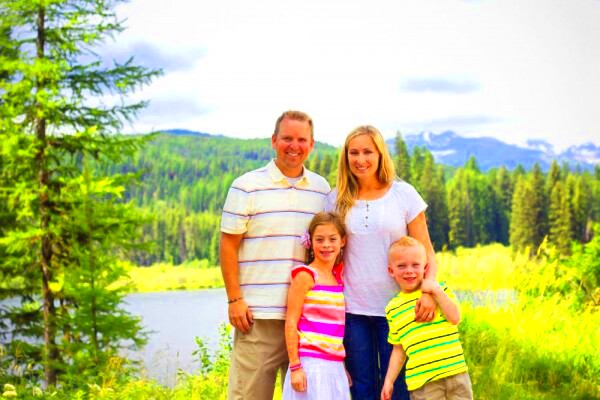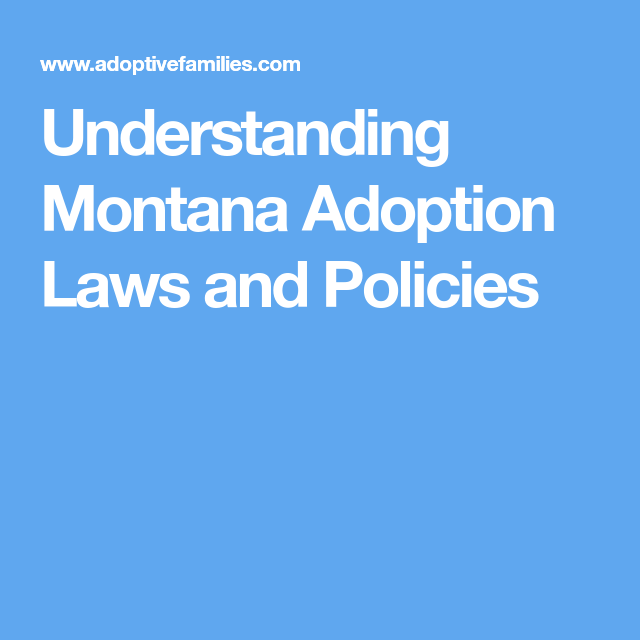Montana Adoption Laws: What to Know
Laws on adoption in the state of Montana are made to ensure that they are in favor of childs’ welfare and that people who want to adopt conform to certain regulations. So, it is important for anybody considering adoption either as a way of expanding their family or as someone trying to help a child get a permanent home, to know more about the procedure involved in adoption in Montana. Indeed, there are explicit state laws indicating who might be suitable applicants, how the entire process is carried out, and what legal rights biological parents possess. For this reason, having this knowledge will enable someone to proceed through these stages with greater confidence and understanding.
Who Can Adopt in Montana

Specific criteria is what qualifies individuals and couples for adoption in Montana. The requirement of being married in order to adopt has no strict stipulations which means that both single individuals as well as married couples may adopt. This is what you must know:
- Age Requirement: You must be at least 18 years old to adopt a child in Montana.
- Marital Status: Both single and married people can adopt. However, if you’re married, both spouses must consent to the adoption.
- Residency: You don’t need to be a Montana resident to adopt, but residency could influence some aspects of the process, such as home studies.
- Criminal Background Check: A thorough background check is required to ensure the safety and welfare of the child.
Montana has necessary conditions for all adoptive parents, so even unmarried and non-residents individuals can adopt children with stable and affectionate homes.
Eligibility for Adopting a Child

Adoption eligibility in Montana does not only focus on the individuals who want to adopt. Also, the state lays down certain requirements for potential adoptive parents to make sure that they are financially, emotionally and physically prepared for this task. Below are some important eligibility factors:
- Financial Stability: You don’t need to be wealthy, but you must demonstrate that you can provide for the child’s basic needs like food, shelter, and education.
- Emotional Readiness: Adoption requires a lifelong commitment. The state will evaluate your emotional readiness and support systems.
- Home Study: A home study is conducted by a licensed agency to assess your living conditions and overall preparedness for adopting a child.
- Health Requirements: Both mental and physical health assessments may be part of the eligibility check to ensure you can care for a child long-term.
Your ability to attend upon fulfilling such conditions does not imply that you will have a fast procedure; nevertheless, it assists one in being ready for particular hurdles and elations associated with adoptive parents.
The Legal Process of Adoption in Montana
In Montana, the procedure for adopting a child encompasses various legal measures aimed at safeguarding the interests of the kid and those who choose to become their new guardians. It is important to take each step in order to keep the adoption valid and legally enforceable. Even though it may appear intricate, understanding these steps better will allow you to get ready well for this ordeal.
Here’s a breakdown of the legal process:
- Filing a Petition: The adoption process begins with filing a petition in the court. This petition contains information about the adoptive parents and the child.
- Home Study: A home study is mandatory and includes a thorough investigation of the home environment, financial stability, and emotional readiness of the adoptive parents.
- Termination of Parental Rights: Before the adoption can proceed, the biological parents’ rights must be legally terminated, either voluntarily or involuntarily, depending on the situation.
- Placement of the Child: Once parental rights are terminated, the child can be placed with the adoptive parents. This placement could be temporary until finalization.
During this period, the child’s best interests will be prioritized in terms of the adoption by a consideration of the law and emotions on the part of all those concerned, such as judges and social workers.
Parental Consent and Rights
Parental consent is highly important for anyone who wants to adopt in Montana. This could result in a lengthy adoption process or lawsuits if the biological parents do not agree. There are certain rules and regulations regarding ending parental rights.
Voluntary Consent: Birth parents can voluntarily relinquish their rights, allowing the child to be adopted. This usually happens when the birth parents believe adoption is in the best interest of the child.
Involuntary Termination: In some cases, the court can terminate parental rights involuntarily. This can happen if the biological parents are unfit, such as in cases of neglect, abuse, or abandonment.
Some things that you should learn about getting parental consent includes:
- Once parental consent is given, it is generally irrevocable, meaning birth parents cannot change their minds after a set period.
- If the child is old enough, usually around the age of 12, the court may also require the child’s consent to the adoption.
- If one parent refuses to consent, it can lead to a contested adoption, which may involve more court hearings and legal challenges.
For both biological and adoptive families as they go through this journey together understanding these factors may help them to relate better with each other.
Adoption Finalization and Court Procedures
The last phase in the adoption process is where adoption is legitimately completed at the law court. This allows you to be on the safe side since most of the challenging tasks have been accomplished until this juncture, but there are still some other items that require attention.
A court date will be set for a hearing which shall include among others, the adoptive parents, the child (if of suitable age) and a judge. The following are activities that take place in finalization:
- Review of Documents: The judge will review all documents related to the adoption, including the home study, parental consent forms, and the adoption petition.
- Judge’s Decision: If everything is in order and the judge finds that the adoption is in the best interest of the child, the adoption will be granted.
- Issuance of Adoption Decree: The court will issue an adoption decree, which legally recognizes the adoptive parents as the child’s legal guardians.
Upon the conclusion of the adoption procedure, an altered birth certificate for the child shall be provided to you which will feature you as the legitimate parents. This court process is the formal closure of the adoption thus giving you complete legal powers and liabilities as their parent.
Open vs. Closed Adoption: What to Consider
Open or closed adoption is a major decision for both adoptive parents and birth parents. Each has its own pros and cons, and knowing how they differ can inform everyone’s choice about what will work best for the child in terms of his or her future.
Open Adoption: In an open adoption, the birth parents and adoptive parents maintain some level of contact. This could range from occasional updates and photos to in-person visits, depending on what both parties agree on. Open adoption offers:
- Transparency: The child may have access to their birth family, medical history, and background, which can help them understand their identity.
- Relationship Building: An ongoing relationship with the birth family can provide emotional support for the child.
- Boundaries: Both sets of parents must agree on the level of contact, which can sometimes lead to complications if expectations differ.
Closed Adoption: In a closed adoption, there is no contact between the birth and adoptive families after the adoption is finalized. The birth parents’ identities are often kept confidential. Closed adoptions may offer:
- Privacy: Both birth and adoptive families may feel more comfortable with a clean break and no future contact.
- Simplicity: Without the need for ongoing communication, closed adoptions can be less emotionally complex.
- Challenges: The child may struggle with questions about their birth family as they grow older and have limited access to their biological history.
The choice of whether to have an open or closed adoption is ultimately determined by families’ preferences and it is thought what is good for the child. Both options can be conducive if one understands them well and observes the limits.
Post-Adoption Legal Responsibilities
Upon the culmination of the adoption process, such persons who have been authorized to offer care for these children assume total rights concerning them as if they were their children by birth. Nevertheless, post-adoption laws are surrounding this practice that must be adhered to.
- Financial Support: Adoptive parents are legally required to provide for the child’s financial needs, including food, education, and healthcare, until they reach adulthood.
- Medical Decisions: Adoptive parents have the right and responsibility to make medical decisions for the child. This includes signing consent forms for treatments, surgeries, and vaccinations.
- Inheritance Rights: Adopted children are entitled to the same inheritance rights as biological children unless otherwise specified in a will.
- Post-Adoption Agreements: In some open adoptions, there may be a legal agreement outlining the terms of communication between the adoptive family and birth parents. While not enforceable in all states, it’s important to honor these agreements if applicable.
Elsewhere in the world, regardless of what happened before them or what was done right or wrong, it has not always been easy for adopted children to adjust well into their new families and maintain a good relationship with their adoptive parents. They have had to undergo difficult transitions which may include relocation from one country to another, learning new languages, and adapting to entirely different customs and traditions from those they were used to. However, despite such hardships imposed on them, some children still grow up appreciating their adoptive parents because of the love and care they provide. When adopting children, many people tend to forget that there are legal consequences involved if such arrangements are not made within the shortest time possible after adoption is finalized. What is more disturbing is that these parents may not think about updating (or even making) their wills or updating other documents like end-of-life plans until it’s too late. Thus, it’s crucial that these obligations be observed so the future of the child can be secured.
Adoptive parents should also know that they might have to change their wills and other legal documents in order to accommodate the new member of the family. Even though legal obligations are just like those of natural parents’, it’s crucial to keep a close watch on the post-adoption responsibilities so that the future life of the child can be ensured.
FAQs About Montana Adoption Laws
1. Can a single person adopt in Montana?
Yes, single individuals can adopt in Montana as long as they meet the necessary requirements, such as being at least 18 years old and passing a home study.
2. How long does the adoption process take?
The Montana adoption procedure has the potential to extend anywhere from a few months all the way to more than one year, varying with the type of adoption and its peculiar situation. The duration is influenced by what is understood as home studies, background checks, and legal processes among others.
3. Do birth parents have any rights after the adoption is finalized?
When adoption is final, the legal rights of birth parents are terminated. However, in open adoption, the parties may still keep in touch if they both consented to it, though these agreements may not always be applicable in law.
4. Is there a waiting period for birth parents to consent to adoption?
In Montana birth mums have a period of three days after which they can consent to their babies’ adoption. Nevertheless, once this consent is granted, it is usually irrevocable except under special cases like manipulation or force.
5. Are there any financial assistance programs for adoptive parents?
For some children, particularly those with special needs, Montana does indeed provide adoption support programs. Such programs can be utilized for healthcare, counseling and other essential services expenses.
Conclusion on Montana Adoption Laws
The adoption laws in Montana cater for the best interest of children, birth parents as well as adoptive families. Although it may appear complicated at first glance, comprehending the legal procedures involved, the rights of parents, and the varying forms of adoption makes it easier for everyone to go through this path with a lot of faith. Open or closed adoption or post-adoption obligations, getting yourself familiar with Montana’s regulations would help you make wise choices about tomorrow. A person’s life is transformed by adopting them; hence when one understands how it works better for all men and women associated with such processes.


